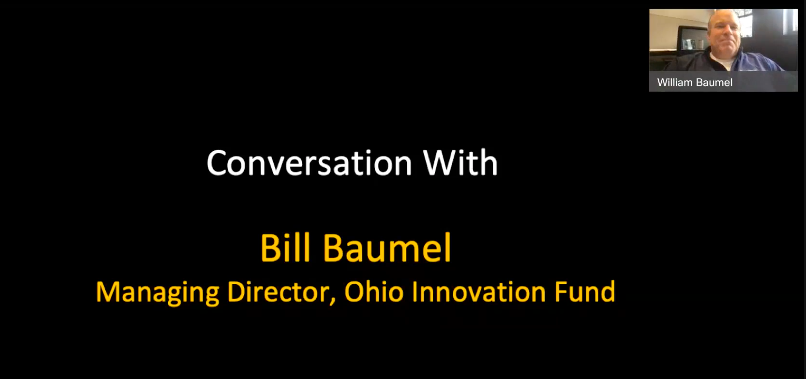Leveraging Channels and Slovenia to build Successful Businesses: Simon Taylor, CEO of HYCU (Part 5)
Sramana Mitra: The business partner who has all these outsourcing companies, is he Slovenian?
Simon Taylor: Serbian actually. He still runs a large outsourcing company. We spun out from them. We started moving very quickly. We added our first 500 customers in our first year. We added a thousand in the second.
Sramana Mitra: This is a crowded space. What was so special about HYCU?
>>>Featured Videos
Roundtable Recap: May 5 – Spotlight on the Ohio Startup Ecosystem

During this week’s roundtable, we had as our guest Bill Baumel, Managing Director at Ohio Innovation Fund, one of the pioneers of the Ohio startup ecosystem.
CaterBite
As for entrepreneur pitch, we had Boddu Venkat Sujith from Visakhapatnam, India, pitch CaterBite, a concept arbitrage on EZCater, a Unicorn.
You can listen to the recording of this roundtable here:
1Mby1M Virtual Accelerator Investor Forum: With Julie Lein, Managing Partner at Urban Innovation Fund (Part 4)
Sramana Mitra: The narrative in the media is how much money have you raised. The maximum focus is on the people raising the most money. That is a flawed way of evaluating companies. There are a lot of innovations that are done in a capital-efficient way. As such, they have a lot more options. The exit option is larger. They are not so dependent on a constant infusion of capital to sustain themselves.
Julie Lein: I agree wholeheartedly. We call those vanity metrics. Capital raise and valuation are extremely important barometers, but they’re not the only ones. They’re the ones that tend to get the most coverage in the media.
>>>Video FAQs
Can 1M/1M Help Me Raise Money?
How Does 1M/1M Democratize Entrepreneurship Education?
How Does 1M/1M Democratize Management Consulting?
When Is The Right Time To Join 1M/1M?
Can 1M/1M Help Me With Business Development?
Can 1M/1M Help Me With Market Sizing?
Can 1M/1M Help Me Validate My Product?
Will I Have Private 1-on-1 Sessions In 1M/1M?
How Does 1M/1M Help Entrepreneurs Connect With Silicon Valley?
Mentoring or Consulting?
Why Does 1M/1M Charge $1000 a Year?
Why Does 1M/1M Partner With Local Organizations?
Why Don\’t Mentoring Networks Work?
Why Is It Important To Study With 1M/1M Now?
Dan Stewart Story
Vikrant Mathur Story
574th Roundtable for Entrepreneurs Starting NOW: Live Tweeting by @1Mby1M
Today’s 574th FREE online 1Mby1M Roundtable For Entrepreneurs is starting NOW, on Thursday, May 5, at 8 a.m. PDT/11 a.m. EDT/5 p.m. CEST/8:30 p.m. India IST. CLICK HERE to join. PASSWORD: startup All are welcome!
574th Roundtable for Entrepreneurs Starting in 30 Minutes: Live Tweeting by @1Mby1M
Today’s 574th FREE online 1Mby1M Roundtable for Entrepreneurs is starting in 30 minutes, on Thursday, May 5, at 8 a.m. PDT/11 a.m. EDT/5 p.m. CEST/8:30 p.m. India IST. CLICK HERE to join. PASSWORD: startup All are welcome!
Apple Expands Product Line-up But Faces Supply Issues

Earlier last week, Apple (Nasdaq: AAPL) announced its second-quarter results that surpassed market expectations. All of Apple’s segments, except the iPad, reported year-on-year growth for the second consecutive quarter this year. In the coming quarters, Apple does not appear to be constrained by market demand, but by market supply.
>>>Leveraging Channels and Slovenia to build Successful Businesses: Simon Taylor, CEO of HYCU (Part 4)
Sramana Mitra: Let’s go to the sales side. How did you leverage the Citrix channel to reach the customer base?
Simon Taylor: I was in my late 20s. I flew to Fort Lauderdale where the Citrix headquarters was. I walked in and just said I wanted to talk to the Alliances team. I was introduced to Vicky Pomarico who was an Alliance Marketing at Citrix. She said, “I don’t know who you are. I don’t know what your company does.” She spent about an hour with me. I said, “I just want to learn how we can be the best possible partner for you. What are the things that partners do that light you up?”
>>>1Mby1M Virtual Accelerator Investor Forum: With Julie Lein, Managing Partner at Urban Innovation Fund (Part 3)
Sramana Mitra: Let’s do some case studies of companies that you’ve invested in that you’re passionate about everything. As you talk through them, talk about what they’re doing. Also, talk about at what stage and in what condition you encountered this company. What was it about that situation that made you write your check?
Julie Lein: One example I can give is our first investment out of our current fund in December 2019. The company is called Electriphi. They are a software solution to manage the transition for fleet owners to electric vehicles. This is an area that we’ve been passionate about for a long time. We deeply believe that the electrification of vehicles is coming.
>>>